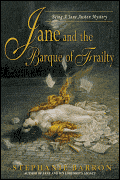Jane and the Barque of Frailty, by Stephanie Barron
Nov 27
2006

Stephanie Barron’s Jane Austen mysteries are always clever, but some of the books in the series are more emotionally effective than others. It’s difficult to forget the facts of Austen’s life—she died young, and never married—and lose oneself in Barron’s world of danger and intrigue. (It was even more difficult to get invested in Barron’s romantic counterpart for Jane, Lord Harold Trowbridge. That was clearly a doomed relationship.) Happily, her most recent entry, Jane and the Barque of Frailty, is sufficiently entertaining to distract readers from the grim reality.
Jane and the Barque of Frailty opens in 1811. Jane is 35 years old and a confirmed spinster, enjoying a stay in London with her brother and sister-in-law as she edits the proofs of what will become her first published novel, Sense and Sensibility. London’s high society is abuzz with rumors about an exiled Russian princess whose shockingly intimate letters have recently been published in the Morning Post. Everyone assumes that the recipient of the letters was Lord Castlereagh, one of England’s leading political figures, and when the unhappy woman is found dead on his doorstep the scandalized whispering about their connection seems likely to end his career.
Barron is a solid researcher of both Austen’s life and the historical events and personages featured in her novel, which include everyone from politicians to the notorious courtesan Harriette Wilson and Mr. Rundell, the owner of the famous Rundell & Bridge jewelry store. I’m always irritated by faux historical spellings (the book is full of “tho’s” and “Publicks”), but Ms. Barron doesn't allow them to overwhelm her style. The only false note was a suggestion at the end of the novel that these were the events that inspired Austen’s Mansfield Park. That seems like a stretch, but the rest of the book is so good that one has to overlook it.
Unfortunately, Barron’s insistence on sticking close to the truth can get a little depressing. She portrays Jane as a woman who describes herself as “haggard”, still mourns her lost love, and is only six years away from death. There’s nothing wrong with this portrayal; it might well be an accurate one (apart from the romance with Lord Harold, spymaster extraordinaire—that’s probably fictional), but it can make for gloomy reading. It would be nice if Ms. Barron were to stretch her re-imagining of Jane’s life a bit further into fiction territory, giving her heroine the happy ending that she deserves.
Jane and the Barque of Frailty opens in 1811. Jane is 35 years old and a confirmed spinster, enjoying a stay in London with her brother and sister-in-law as she edits the proofs of what will become her first published novel, Sense and Sensibility. London’s high society is abuzz with rumors about an exiled Russian princess whose shockingly intimate letters have recently been published in the Morning Post. Everyone assumes that the recipient of the letters was Lord Castlereagh, one of England’s leading political figures, and when the unhappy woman is found dead on his doorstep the scandalized whispering about their connection seems likely to end his career.
Barron is a solid researcher of both Austen’s life and the historical events and personages featured in her novel, which include everyone from politicians to the notorious courtesan Harriette Wilson and Mr. Rundell, the owner of the famous Rundell & Bridge jewelry store. I’m always irritated by faux historical spellings (the book is full of “tho’s” and “Publicks”), but Ms. Barron doesn't allow them to overwhelm her style. The only false note was a suggestion at the end of the novel that these were the events that inspired Austen’s Mansfield Park. That seems like a stretch, but the rest of the book is so good that one has to overlook it.
Unfortunately, Barron’s insistence on sticking close to the truth can get a little depressing. She portrays Jane as a woman who describes herself as “haggard”, still mourns her lost love, and is only six years away from death. There’s nothing wrong with this portrayal; it might well be an accurate one (apart from the romance with Lord Harold, spymaster extraordinaire—that’s probably fictional), but it can make for gloomy reading. It would be nice if Ms. Barron were to stretch her re-imagining of Jane’s life a bit further into fiction territory, giving her heroine the happy ending that she deserves.
Posted by: Julia, Last edit by: Julianka
No new comments are allowed on this post.
Comments
The Angry Carrot
This is a great series--much better than the vast, VAST majority of Austen faux-sequels, re-tellings, and different-points-of-view (most of which stink). Very good review!